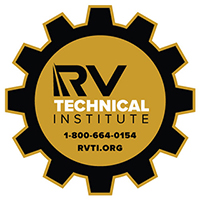The following was a News & Insights report from the RV Industry Association (RVIA).
The RV Technical Institute (RVTI) recently concluded Level 2 training with the Great American RV Superstores’ Hammond, Louisiana, dealership. Their team completed the level with the Institute’s hybrid option — 11 weeks of online courses followed up with one week of in-person, hands-on experience.
This is Great American RV Superstores’ second technician training with the RV Technical Institute. They have 11 dealerships across Louisiana, Mississippi, Alabama, Florida and Tennessee.
During Level 2 training, RV technicians develop theoretical knowledge of all the systems and components within an RV, including propane, electrical, plumbing, appliances, body, generator and chassis. A learner who successfully completes the training will leave with a proven skill set to be able to perform basic diagnostics, troubleshooting and repairs on those systems and components.
The RV Technical Institute spoke with Great American RV Superstores’ Fixed Operations Education Director, Greg Dewalt, about his dealership’s training experience. Find out more below:
What initially drew you to the RV Technical Institute’s program?
Great American RV Superstores has always valued training. Training has such a positive impact on the team. It allows our technicians to grow professionally because it increases their skill level.
They learn new knowledge, new systems and repair procedures. Most importantly it gives them confidence in their abilities and increases their productivity and efficiency. And this all culminates in better customer service. That’s our goal. If you take care of your customers, they’ll come back. By providing this training to our technicians we can affect a better repair in a timelier manner.
Their knowledge expands and they start sharing that knowledge with others. You’ll have better performance and boost the motivation of your technicians if they see you’re investing in them.
During the course, what aspect(s) of the Institute’s training experience were the most beneficial to you and why?
We took our technicians through the RV Technical Institute’s Level 2 hybrid program for the first time last fall. They went to the training sessions by themselves during the online portion of the course. Every week we checked in with them to reinforce what they learned and encouraged them to keep putting in the work for success. We’d also review the high points of those sessions and ask them to talk about what they were learning.
And then at the end of that, Bill Stewart (the Institute’s director of education), led the hands-on labs. The techs had the advantage of Bill and his knowledge. He’s a great instructor and a wealth of knowledge. The technicians really enjoy it when Bill comes down because he makes it fun, they learned a lot, and he emphasizes why learning this is so important.
Last fall’s hands-on portion was taught two separate times, first at our dealership in Calera, Alabama, and then again at our location in Hammond, Louisiana, to accommodate the large number of attendees. Everyone passed and became certified. It spread like wildfire through the company. Everybody was talking about how great it was and what they learned. We just finished up another hybrid course’s hands-on labs a week ago in Hammond. We certified nine more Level 2 technicians, and it was a great success. The guys love it and they’re excited about the next one.
Since completing the course, how has your Institute training helped the career of your RV technicians?
After technicians take Level 2, they’re excited to start Level 3. They want to know what it takes to start those courses and how they can become certified in all five disciplines (appliances, electrical, electronics, chassis and slideouts). I think it’s a great motivator and learning opportunity for them as they continue with the training. It’s a win-win-win all the way around.
As an RV Technical Institute Authorized Training Partner+, Great American RV Superstores can access the Institute’s comprehensive RV technician training curriculum and tools to train their technicians, as well as attend in person training sessions at the Institute.
